Part One: Jerusalem
In the Temple of Jerusalem the Hebrews are praying to their God to protect them from the Babylonian king Nabucco and his army. Zaccaria, the high priest, urges his people to place their trust in God, telling them that Fenena, Nabucco’s younger daughter, could bring about peace. Out of her love for him, Fenena had once freed Ismaele, the nephew of the Jewish king, from imprisonment in Babylon, and had fled with him to become a hostage among the Hebrews. Nabucco’s elder daughter Abigaille infiltrates the Temple with her warriors, disguised as Jews. She also loves Ismaele and is prepared to spare his people if he returns her affections. But Ismaele turns her down. A triumphant Nabucco appears. In order to prevent the desecration of the Temple, Zaccaria threatens to kill Fenena – but Ismaele liberates his beloved. Nabucco, Abigaille and the Babylonian warriors take revenge. Zaccaria and the entire Jewish people curse the traitor Ismaele.
Part Two: The Unbeliever
Back in Babylon, Abigaille finds a document that reveals her true origins. She is the daughter of a slave, meaning that Fenena is actually the lawful heiress to the throne. Nabucco has already appointed Fenena as regent while he is away in the wars. The high priest of Baal reports to Abigaille that Fenena intends to release the abducted Hebrew captives who have been brought to Babylon. The high priest and his co-conspirators plan to crown Abigaille, and to this end spread the rumour that Nabucco has fallen in battle.
Zaccaria prays to God to support him in his plan to convert Fenena. The Levites assemble and are intransigent towards Ismaele. Zaccaria and his sister Anna plead with them to forgive Ismaele. When Fenena hears that Nabucco has fallen and that Abigaille is now planning to become Queen, she decides to punish the Babylonian rebels. With the support of the high priest, Abigaille demands the crown from Fenena. Nabucco, now generally believed dead, returns and insists that from now on he be not only be revered as king, but worshipped as a god. A flash of lightning punishes this display of hubris and Nabucco loses his senses. Abigaille crowns herself.
Part Three: The Prophecy
Abigaille’s subjects are paying homage to her. In the name of the people, the high priest demands the execution of the Hebrews and the converted Fenena. Abigaille obtains consent for the death sentence from her insane father – Nabucco finds out too late that he has also condemned Fenena to death. Abigaille destroys the evidence of her lowly origins and has Nabucco thrown in jail. The Jews lament their captivity. Zaccaria prophesies the downfall of Babylon and tells the Jews that they will soon be able to return to their home.
Part Four: The Shattered Idol
Fenena and the Jews are being led to the execution site. In his despair Nabucco prays to Jehovah, the God of the Hebrews. His madness leaves him. Accompanied by his loyal followers, Nabucco liberates the condemned captives. He orders the idol of Baal to be destroyed, but at his words it shatters into pieces. Nabucco expresses his allegiance to Jehovah and grants the Jews their freedom. As she dies, Abigaille prays to the God of the Jews for forgiveness.
Time: 587 BC
Place: Jerusalem and Babylon
Act 1: Jerusalem
'Thus saith the Lord, Behold, I shall deliver this city into the hand of the King of Babylon, and he will burn it with fire' (Jeremiah 21:10)
Interior of the Temple of Solomon
The Israelites pray as the Babylonian army advances on their city ("Gli arredi festivi giù cadano infranti" / "Throw down and destroy all festive decorations"). The High Priest Zaccaria tells the people not to despair but to trust in God ("D'Egitto là su i lidi" / "On the shores of Egypt He saved the life of Moses"). The presence of a hostage, Fenena, younger daughter of Nabucco, King of Babylon, may yet secure peace ("Come notte a sol fulgente" / "Like darkness before the sun"). Zaccaria entrusts Fenena to Ismaele, nephew of the King of Jerusalem and a former envoy to Babylon. Left alone, Fenena and Ismaele recall how they fell in love when Ismaele was held prisoner by the Babylonians, and how Fenena helped him to escape to Israel. Nabucco's supposed elder daughter, Abigaille, enters the temple with Babylonian soldiers in disguise. She, too, loves Ismaele. Discovering the lovers, she threatens Ismaele: if he does not give up Fenena, Abigaille will accuse her of treason. If Ismaele returns Abigaille's love, however, Abigaille will petition Nabucco on the Israelites' behalf. Ismaele tells Abigaille that he cannot love her and she vows revenge. Nabucco enters with his warriors ("Viva Nabucco" / "Long live Nabucco"). Zaccaria defies him, threatening to kill Fenena if Nabucco attacks the temple. Ismaele intervenes to save Fenena, which removes any impediment from Nabucco destroying the temple. He orders this, while Zaccaria and the Israelites curse Ismaele as a traitor.
Act 2: The Impious One
'Behold, the whirlwind of the Lord goeth forth, it shall fall upon the head of the wicked' (Jeremiah 30:23)
Scene 1: Royal apartments in Babylon
Nabucco has appointed Fenena regent and guardian of the Israelite prisoners, while he continues the battle against the Israelites. Abigaille has discovered a document that proves she is not Nabucco's real daughter, but the daughter of slaves. She reflects bitterly on Nabucco's refusal to allow her to play a role in the war with the Israelites and recalls past happiness ("Anch'io dischiuso un giorno" / "I too once opened my heart to happiness"). The High Priest of Bel informs Abigaille that Fenena has released the Israelite captives. He plans for Abigaille to become ruler of Babylon, and with this intention has spread the rumour that Nabucco has died in battle. Abigaille determines to seize the throne ("Salgo già del trono aurato" / "I already ascend the golden throne").
Scene 2: A room in the palace
Zaccaria reads over the Tablets of Law ("Vieni, o Levita" / "Come, oh Levite!"), then goes to summon Fenena. A group of Levites accuse Ismaele of treachery. Zaccaria returns with Fenena and his sister Anna. Anna tells the Levites that Fenena has converted to Judaism, and urges them to forgive Ismaele. Abdallo, a soldier, announces the death of Nabucco and warns of the rebellion instigated by Abigaille. Abigaille enters with the High Priest of Bel and demands the crown from Fenena. Unexpectedly, Nabucco himself enters; pushing through the crowd, he seizes the crown and declares himself not only king of the Babylonians but also their god. The high priest Zaccaria curses him and warns of divine vengeance; an incensed Nabucco in turn orders the death of the Israelites. Fenena reveals to him that she has embraced the Jewish religion and will share the Israelites' fate. Nabucco is furious and repeats his conviction that he is now divine ("Non son più re, son dio" / "I am no longer King! I am God!"). There is a crash of thunder and Nabucco promptly loses his senses. The crown falls from his head and is picked up by Abigaille, who pronounces herself ruler of the Babylonians.
Act 3: The Prophecy
'Therefore the wild beasts of the desert with the wild beasts of the islands shall dwell there, and the owls shall dwell therein'. (Jeremiah 50:39)
Scene 1: The Hanging Gardens of Babylon
Abigaille is now Queen of Babylon. The High Priest of Bel presents her with the death warrant for the Israelites, as well as for Fenena. Nabucco, still insane, tries to reclaim the throne without success. Though his consent to the death warrant is no longer necessary, Abigaille tricks him into signing it. When Nabucco learns that he has consigned his (true) daughter to death, he is overcome with grief and anger. He tells Abigaille that he is not in fact her father and searches for the document evidencing her true origins as a slave. Abigaille mocks him, produces the document and tears it up. Realizing his powerlessness, Nabucco pleads for Fenena's life ("Oh di qual onta aggravasi questo mio crin canuto" / "Oh, what shame must my old head suffer"). Abigaille is unmoved and orders Nabucco to leave her.
Scene 2: The banks of the River Euphrates
The Israelites long for their homeland ("Va, pensiero, sull'ali dorate" / "Fly, thought, on golden wings"). The high priest Zaccaria once again exhorts them to have faith: God will destroy Babylon. The Israelites are inspired by his words.
Act 4: The Broken Idol
'Bel is confounded, Merodach is broken to pieces; her idols are confounded, her images are broken in pieces.' (Jeremiah 50:2)
Scene 1: The royal apartments, Babylon
Nabucco awakens, still confused and raving. He sees Fenena in chains being taken to her death. In despair, he prays to the God of the Hebrews. He asks for forgiveness, and promises to rebuild the temple in Jerusalem and convert to Judaism if his prayers are answered ("Dio di Giuda" / "God of Judah!"). Miraculously, his strength and reason are immediately restored. Abdallo and loyal soldiers enter to release him. Nabucco resolves to rescue Fenena and the Israelites as well as to punish the traitors.
Scene 2: The Hanging Gardens of Babylon
Fenena and the Israelite prisoners are led in to be sacrificed ("Va! La palma del martirio" / "Go, win the palm of martyrdom"). Fenena serenely prepares for death. Nabucco rushes in with Abdallo and other soldiers. He declares that he will rebuild the Temple of Jerusalem and worship the God of the Israelites, ordering the destruction of the idol of Bel. At his word, the idol falls to the ground of its own accord and shatters into pieces. Nabucco tells the Israelites that they are now free and all join in praise of Jehovah. Abigaille enters, supported by soldiers. She has poisoned herself. She begs forgiveness of Fenena, prays for God's mercy and dies. Zaccaria proclaims Nabucco the servant of God and king of kings.


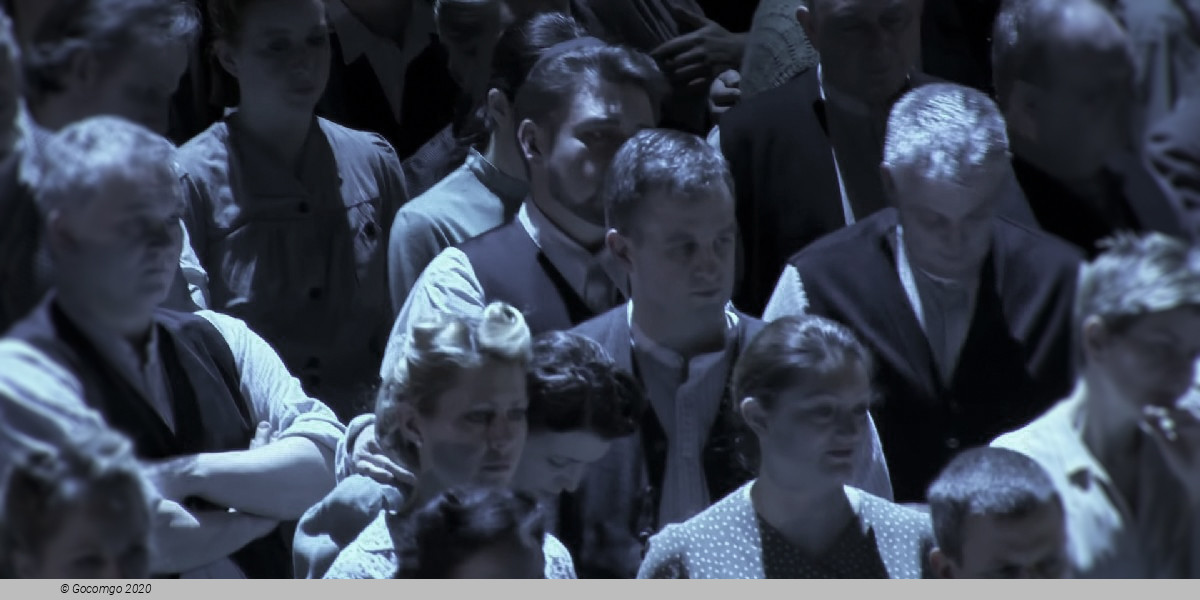
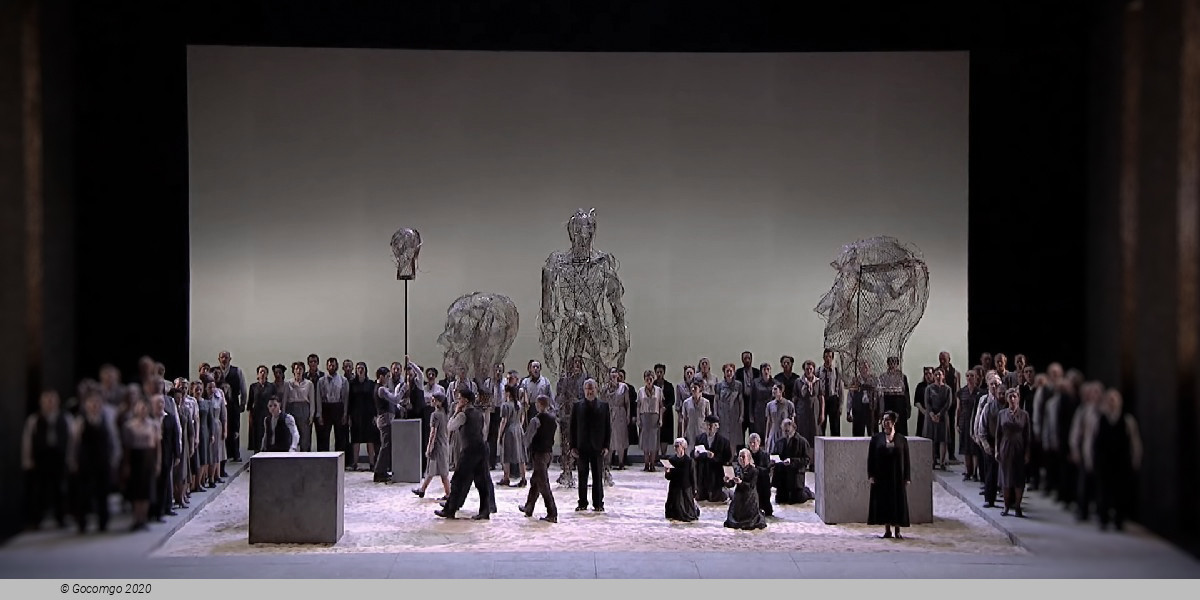
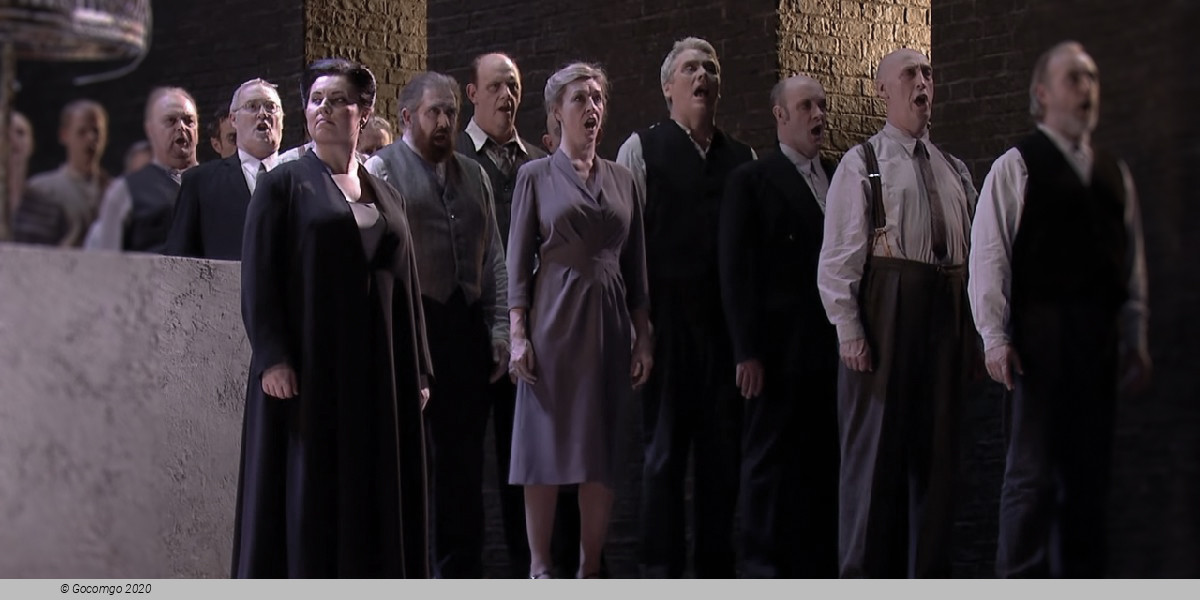
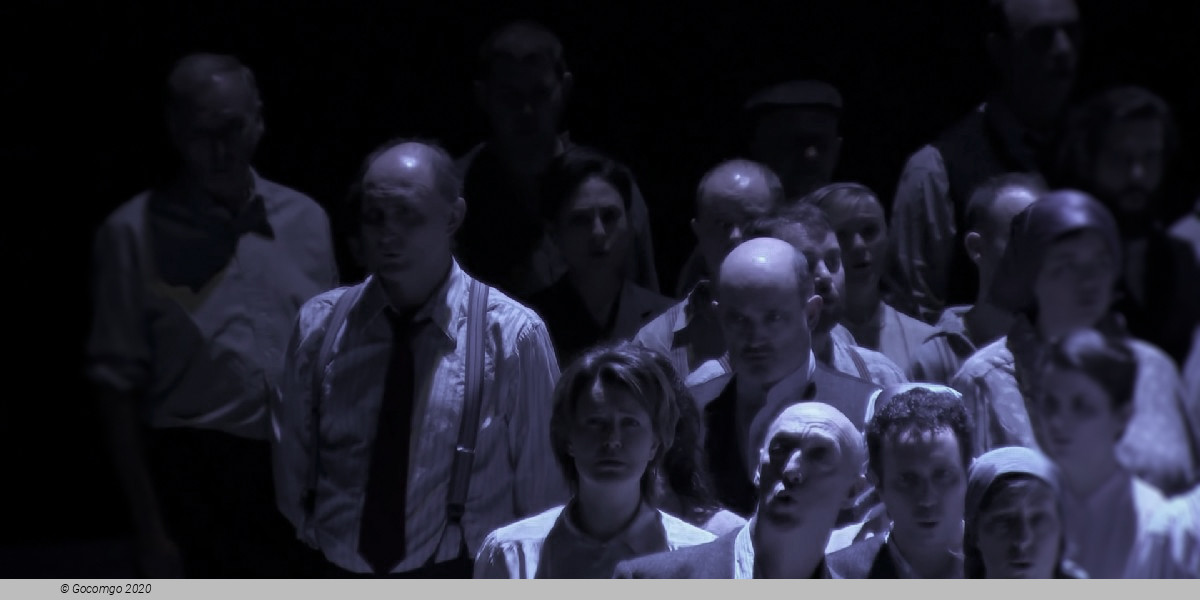
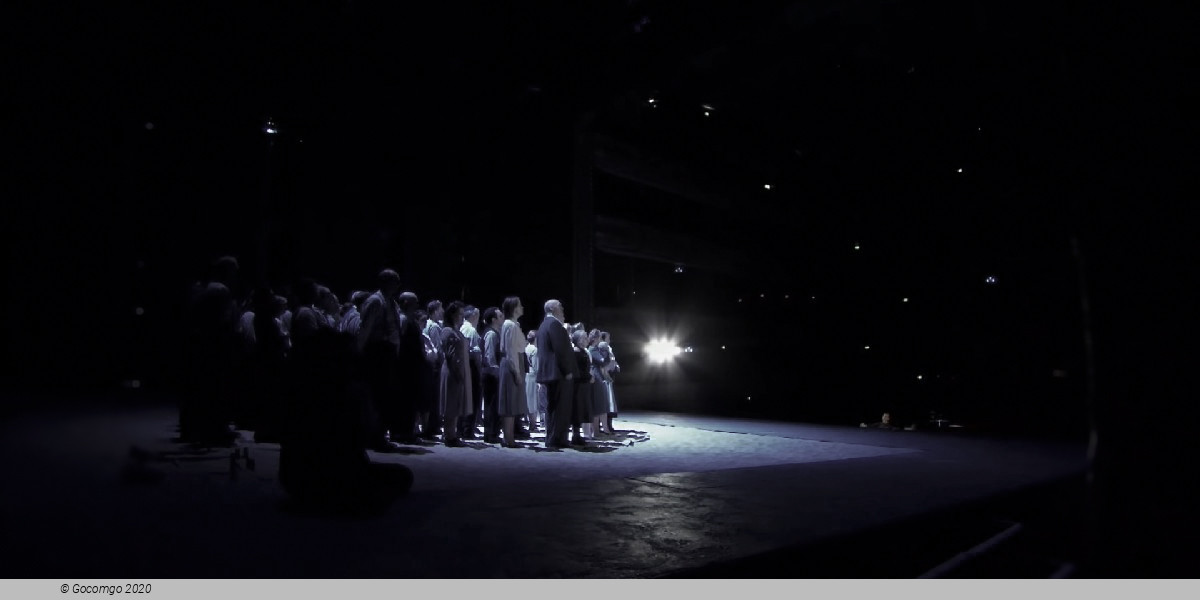
 Max-Joseph-Platz 2
Max-Joseph-Platz 2